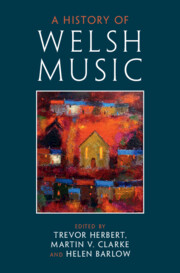Book contents
- A History of Welsh Music
- A History of Welsh Music
- Copyright page
- Contents
- Figures
- Maps
- Music Examples
- Contributors
- Preface
- Acknowledgements
- Glossary
- Maps
- Chapter 1 Music in Welsh History
- Chapter 2 Words for Music
- Chapter 3 Music in Worship before 1650
- Chapter 4 Secular Music before 1650
- Chapter 5 The Eisteddfod Tradition
- Chapter 6 Women and Welsh Folk Song
- Chapter 7 Instrumental Traditions after 1650
- Chapter 8 The Celtic Revival
- Chapter 9 Musical Communications in the Long Nineteenth Century
- Chapter 10 Nonconformists and Their Music
- Chapter 11 Professionalisation in the Twentieth Century
- Chapter 12 Composing Cymru
- Chapter 13 Traditions and Interventions
- Chapter 14 New Traditions
- Chapter 15 Singing Welshness
- Chapter 16 Postscript
- Book part
- Bibliography
- Index
Chapter 10 - Nonconformists and Their Music
Published online by Cambridge University Press: 08 September 2022
- A History of Welsh Music
- A History of Welsh Music
- Copyright page
- Contents
- Figures
- Maps
- Music Examples
- Contributors
- Preface
- Acknowledgements
- Glossary
- Maps
- Chapter 1 Music in Welsh History
- Chapter 2 Words for Music
- Chapter 3 Music in Worship before 1650
- Chapter 4 Secular Music before 1650
- Chapter 5 The Eisteddfod Tradition
- Chapter 6 Women and Welsh Folk Song
- Chapter 7 Instrumental Traditions after 1650
- Chapter 8 The Celtic Revival
- Chapter 9 Musical Communications in the Long Nineteenth Century
- Chapter 10 Nonconformists and Their Music
- Chapter 11 Professionalisation in the Twentieth Century
- Chapter 12 Composing Cymru
- Chapter 13 Traditions and Interventions
- Chapter 14 New Traditions
- Chapter 15 Singing Welshness
- Chapter 16 Postscript
- Book part
- Bibliography
- Index
Summary
The centrality of congregational singing to nonconformist religious practice in Wales since the eighteenth century has afforded hymnody a significant place in scholarly and popular understandings not only of religion in Wales but also of the place of music in Welsh cultural life more broadly. This chapter examines the influence of both the musical practices and repertoire of Welsh nonconformity. Taking the Aber valley in south Wales as a case study, it explores how diverse influences such as industry, demographics, denominational affiliation and theology shaped the development of nonconformist hymnody from the eighteenth century onwards. It considers the extent to which chapels functioned as a focal point for communal activity, and the prominence of music within the activities that took place, especially the cymanfa ganu and revival meetings. In terms of repertoire, it assesses the musical characteristics of a body of tunes that emerged a century or more later than the period in which Welsh hymn writing flourished in the work of Williams Pantycelyn, Ann Griffiths and others. It considers how these tunes and the texts with which they have been paired have influenced perceptions of Welsh musicality and religious identity within and beyond Welsh nonconformity and beyond the borders of Wales.
- Type
- Chapter
- Information
- A History of Welsh Music , pp. 218 - 242Publisher: Cambridge University PressPrint publication year: 2022



